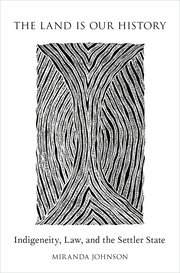Dear Colleagues and friends of History,
Because we may not all get an opportunity to see Miranda before she formally takes up her new post at the University of Otago, I wanted to say a few words before she leaves. It goes without saying that her departure will be a huge loss to the Department, SOPHI and the University.
Miranda started with Warwick Anderson in REGS in August 2012 as one of the first PDRAs in the Laureate program. As Warwick often has said, she proved to be not only a wonderfully engaging and productive colleague and collaborator, she intellectually transformed the program, especially though her ideas about Indigenous racial modernities. It was during this period that she wrote The Land is Our History (2016) and organised a very successful international conference resulting in the co-edited collection Pacific Futures: Past and Present (2018). She worked hard to build programs in Pacific and Indigenous histories in the Department and across the University, a valiant effort she redoubled on taking up a teaching position in the Department in July 2015, where she immediately excelled.
In 2017, Miranda’s teaching was acknowledged with a FASS ‘Excellence in Teaching’ Award, particularly for her hands-on engagement with students and guests in her unit entitled The Pitcairn Project (where you can read about some of the students’ work).
In the same year, The Land is Our History, was shortlisted for the General History Prize in the NSW Premier’s History Awards. The judges described Miranda’s work in glowing terms:
‘The Land Is Our History’ is a superb example of the power of comparative, transnational historical research. It explores indigenous rights movements, from the late 1960s onwards, across three Commonwealth settler states — Canada, Australia and Aotearoa New Zealand. Miranda Johnson draws on a rich array of source material, including legal cases, petitions, interviews and media reports, to create an engaging and path-breaking book.
In 2018, The Land is Our History was awarded the W.K. Hancock Prize of the Australian Historical Association, and it is worth quoting the citation in full:
Miranda Johnson has produced an ambitious, original and imaginative history exploring land, indigeneity, legal rights and activism across three settler-colonial nations. Thinking transnationally, Johnson explores legal and public discourses to draw together a raft of distinctive events and personalities into a vast and coherent canvas. She weaves nation-based histories of indigenous-settler conflict over land into wider networks and power structures, making sense of seemingly disparate developments in indigenous activism. Archival documents and oral accounts highlight the strength and moral authority of indigenous leaders who worked to gain acknowledgement of traditional ownership of land, and to interrupt and influence public debates around national identity. Johnson writes with precision, flow and economy. The work has a compelling argument, convincingly showing the complex and sophisticated ways indigenous activisms functioned to change settler attitudes towards land and indigenous belonging. An exemplary history, The Land Is Our History brings important new insights to a significant topic in both the past and the present.

Miranda talked about her work with student Ryan Cropp.
More recently, Miranda showcased some of her new work on legal history and Native identities in an essay in the internationally renowned journal, American Historical Review, entitled “The Case of the Million Dollar Duck: A Hunter, His Treaty, and the Bending of the Settler Contract.”
I’ll always remember co-teaching ‘Frontier Violence in Modern Memory’ with Miranda in 2017. There’s probably no better way to get to know your colleagues! Working closely with Miranda allowed me to see first-hand what a brilliant teacher and scholar she is. I heard nothing but praise and appreciation from students for her teaching and I picked up quite a few tips watching her lectures from the front row.
Miranda’s commitment to her students, the Department and the broader University community is on graphic display in her recent reflection on online teaching, published online in Meanjin.
It’s a plea for ‘the poetics of in-person classroom teaching, not as a value-added extra for an elite cohort, but as the essence of what we do’. It’s also a reminder of what her students and colleague will miss when she goes.
We need to establish respectful and generative classroom dynamics quickly with and among our students, many of whom do not know each other. These dynamics must be subtly but firmly maintained. How do you draw out the shy ones? Put them in small-groups, often awkward in many of the classrooms we are working in, but achievable if the chairs or tables can be moved around. How do you moderate the domineering over-talker in class? Sit beside them. Make eye contact with everyone during the session, although not too much. Help them be seen. Notice the one who pushes his chair back, angling his body back from the desk, his gaze directed anywhere but here. Bring him back. Watch for the over-anxious, fastidiously taking notes in order to avoid answering questions.
I’m sure that I speak for everyone when I wish Miranda and her family well for their future lives and careers in Aotearoa NZ.
All best wishes,
Mark McKenna, Chair, Department of History


Lovely words in appreciation of Miranda’s too short time with us in History. Miranda, I wish you well in your new position.